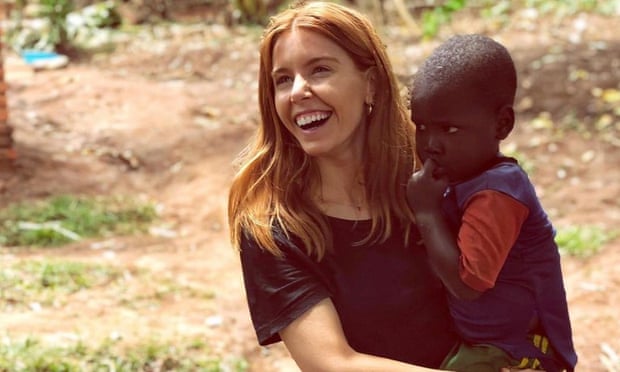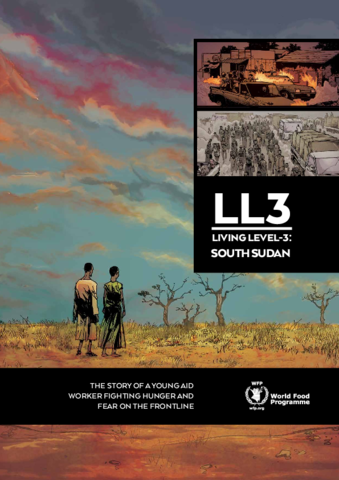The David Lammy/White Saviour versus Stacey Dooley/Comic Relief debate is an excellent opportunity to look at some of the core elements of ritual communication behind many debates in international development-especially when charities and celebrities are involved!
At the time of writing the debate has already followed the first seven or eight steps and I’m pretty sure that it will go full circle between now and Red Nose Day 2020…
1. Don’t learn from past debates
It is worth remembering that this is not some obscure debate a few development bloggers have pointed out. In late 2017, Comic Relief got called out for their video of sending Ed Sheeran to Liberia.
A quick reminder from a December 2017 Guardian piece:
The current problems for Comic Relief started when black British Labour MP David Lammy who also happens to have a substantial social media following pointed out Dooley’s white saviourism in Uganda; this is the kind of communication disaster that is difficult to ignore.
Comic Relief responded with charity plastic speak along the lines of a phone hotline that promises “your call is important to us”.
Stacy Dooley responded like any celebrity would have done by stressing that she this is about childrens' lives and that she does not really see the problem and really, really only had good intentions.
As this is not just an isolated event more thoughtful critique emerges, the kind of critique that is not new, that has been around since the last charity communication blunder and that proves that there is a lot of critical support for charities and international development if you want to read up on the topic.
Gaby Hinsliff's editorial in the Guardian is a good example:
Now “local voices” enter the debate, confirming the problematic nature of the endeavour, offering support and broader historical perspectives (note the low engagement with their piece compared to previous articles on the topic):
In this day and age the media always have a space for “the other side”, a seemingly alternative view that usual supports the status quo or makes some generic reference to a past where not everything was really that bad and that celebrities, really, are more less or less caring people just like us.
Barbara Ellen's editorial in the Guardian has gained significant engagement:
At the time of writing we have reached this stage, but I’m sure that’s not quite the end of the debate and a few more people will step in.
9. Announce tokenistic measure to counter white saviourism
Without admitting failure and likely with more carefully drafted PR language some change will be announced for “next year” or a similar date in a conveniently distant future...
10. Back to #1 ?!?
At the time of writing the debate has already followed the first seven or eight steps and I’m pretty sure that it will go full circle between now and Red Nose Day 2020…
1. Don’t learn from past debates
It is worth remembering that this is not some obscure debate a few development bloggers have pointed out. In late 2017, Comic Relief got called out for their video of sending Ed Sheeran to Liberia.
A quick reminder from a December 2017 Guardian piece:
The Sheeran-fronted Comic Relief video, during which the singer offers to pay hotel costs for street children in Liberia, verged on “poverty tourism”, according to the jury.Thoughtful responses included one by Jennifer Lentfer, reminding us:
(...)“Ed Sheeran has good intentions,” she said. “But the problem is the video is focused on Ed Sheeran as the main character. He is portrayed as the only one coming down and being able to help.”
After watching Ed Sheeran’s video, people want to immediately “do something.” International NGOs offer a ready-made click to assuage that sadness, pity, guilt, or shame. We have an opportunity to persuade, influence, motivate, and educate. But instead, potential donors are coddled and/or prodded, e.g. read/watch this and give us money, rather than involving them as part of a greater collective effort.And Comic Relief promised change (well, with some small print at the end...) in a March 2018 piece for NPR's Goats & Soda:
In its 2018 ads, Comic Relief says it is working to highlight local voices.2. Get called out for white saviourism
"We should give the strongest possible voice to people we work with, whether those are people here in U.K., or our work in Africa, because it feels right," says Ben Maitland, head of national media for Comic Relief.
But they're also not giving up on the celebrity angle.
The current problems for Comic Relief started when black British Labour MP David Lammy who also happens to have a substantial social media following pointed out Dooley’s white saviourism in Uganda; this is the kind of communication disaster that is difficult to ignore.
Following her win on Strictly Come Dancing last year, Stacey flew to Uganda to use her renewed star power to highlight the struggles of people living in poverty there.
However, although trying to do something good with her platform, Stacey has found herself under attack from a group called No White Saviours who disagree with white people spotlighting poverty in Africa.
3. Defend white saviourism, ideally with elements of corporate PR speakThe world does not need any more white saviours. As I've said before, this just perpetuates tired and unhelpful stereotypes. Let's instead promote voices from across the continent of Africa and have serious debate.https://t.co/LySa0BXeyi— David Lammy (@DavidLammy) February 27, 2019
Comic Relief responded with charity plastic speak along the lines of a phone hotline that promises “your call is important to us”.
"We are really grateful that Stacey Dooley, an award-winning and internationally acclaimed documentary-maker, agreed to go to Uganda to discover more about projects the British people have funded there and make no apologies for this.I’m glad David Lammy declined said offer:
"She has filmed and reported on challenging issues all over the world, helping to put a much-needed spotlight on issues that affect people's lives daily.
"In her film, people working with or supported by Comic Relief projects tell their own stories in their own words. We have previously asked David Lammy if he would like to work with us to make a film in Africa and he has not responded. The offer is still open."
Lammy said he “was not prepared to become part of a PR exercise”. On Twitter, he wrote: “It’s simply not true to say I did not respond: we had two meetings in my office. I had hoped – and still hope – your coverage would improve but Stacey’s post was more of the same tried [sic] tropes. As I told you before, I’m not prepared to become part of a PR exercise.4. Celebrity “defends” themselves
Stacy Dooley responded like any celebrity would have done by stressing that she this is about childrens' lives and that she does not really see the problem and really, really only had good intentions.
5. Thorough & thoughtful critique continuesDavid, is the issue with me being white? (Genuine question) ...because if that’s the case, you could always go over there and try raise awareness? Comic relief have raised over 1 billion pounds since they started.— Stacey Dooley (@StaceyDooley) February 27, 2019
I saw projects that were saving lives with the money. Kids lives. https://t.co/pPgez9OxN8
As this is not just an isolated event more thoughtful critique emerges, the kind of critique that is not new, that has been around since the last charity communication blunder and that proves that there is a lot of critical support for charities and international development if you want to read up on the topic.
Gaby Hinsliff's editorial in the Guardian is a good example:
The irony is that they must have seen in Dooley a rare combination of stardust and the ability to report from, rather than merely be photographed in front of, challenging environments. For while it was Strictly that catapulted her into the big league, she’s also a documentary-maker who has presented films on everything from people trafficking to arms dealing, someone used to being behind as well as in front of a camera. Choosing her was presumably meant as a step towards the aims of the campaign group No White Saviors, which in criticising the Dooley picture made it clear it doesn’t want to stop white people coming to Africa, merely to stop white people making themselves the hero of the story. What makes that so difficult for some to take is that it isn’t just about asking one presenter to take a back seat, but also all those viewers who unconsciously identify with her.Shaista Aziz and Alexia Pepper de Caires for example link historical developments and the situation in the UK to global issues in a more comprehensive and radical way:
The continued fundraising drive at the heart of Comic Relief’s mission has conveniently twisted all moves to acknowledge Britain’s historical and ongoing role in WHY countries lack strong governance, and wealth from their natural resources and stability from the politics of citizenship, not global charity.6. Local voice enters the stage
Now “local voices” enter the debate, confirming the problematic nature of the endeavour, offering support and broader historical perspectives (note the low engagement with their piece compared to previous articles on the topic):
NWS, which emphasises on its website that it is a “majority female, majority east African group”, extended an invitation to Dooley, saying it hoped she would take it as an opportunity to listen and learn. But it said she did not reply. The group wrote on Instagram: “Ms Dooley, we need you to know our invitation is still open, we provided feedback about how you could do better, so has David Lammy as well as countless others. You’ve chosen to disregard, double down and ignore the constructive feedback.7. Is this debate going too far?
In this day and age the media always have a space for “the other side”, a seemingly alternative view that usual supports the status quo or makes some generic reference to a past where not everything was really that bad and that celebrities, really, are more less or less caring people just like us.
Barbara Ellen's editorial in the Guardian has gained significant engagement:
While it’s good to learn that experts and locals are to feature more prominently in on-the-ground charity appeals, in the UK and abroad, could cynicism about the use of celebrities be taken too far? It’s as though they must be kept away from affected regions in case they invalidate the appeal. The brutal truth is that celebrities are there for a reason. Presumably people are aware of how difficult it is for charities to raise awareness and funds. That, with someone such as Dooley, it’s about using a celebrity, black or white, to draw people in.Then there’s the issue of celebrity motivation. Sure, some celebrities might be egomaniacal monsters, whose only concern is that they look hot in cargo pants, but with most, the basic human instinct would be to want to help. If that’s your motivation, then why the grim rush to question theirs?8. Critique fades out
At the time of writing we have reached this stage, but I’m sure that’s not quite the end of the debate and a few more people will step in.
9. Announce tokenistic measure to counter white saviourism
Without admitting failure and likely with more carefully drafted PR language some change will be announced for “next year” or a similar date in a conveniently distant future...
10. Back to #1 ?!?








